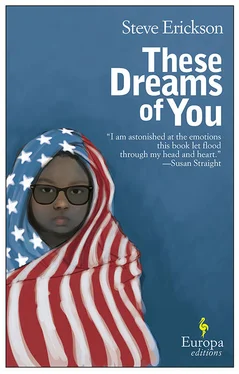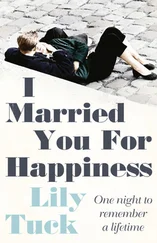For a moment she sees the man behind the.22-caliber gun, dark and small, no bigger than his target, twenty-four years old, half of them spent growing up in Palestine and the other half in Pasadena fifteen minutes away. He’s cased the hotel for the last several days; his diaries will reveal that his planning was methodical. In the months to come, Jasmine will try to establish some connection, something about the man to relate to, though why she needs to understand anything about him, she doesn’t know; she wonders what music is in his head when he perforates the target with the four shots from the gun — don’t assassins have music in their heads?
There in the ensuing tumult of the hotel, fear dies along with her dread, and anticipation along with her hope. She feels like she might go under the madness like the teenage boy she pulled from the frenzied crowd a few weeks ago, not caught in others’ current but rather a current of her own in which she now not only expects drowning but desires it. “We’re a great country,” are practically his last words, “we’re a selfless country, a compassionate country,” and before mounting the stage he confides in her, “I’ve finally become who I am”—but in an instant, politics reverts to meaninglessness again. “Don’t think,” she answers to his memory afterward when no one is around, sometime when she’s alone in a room, sometime on a bus, sometime walking along the sea, “that your death inspired anything. Don’t think,” she cries, “that I believe yours was anything but a freak flame in the dark, one random flash of beauty that happens not because it means anything but because in a universe of such chaos even beauty is going to have its moment, by sheer chance,” and finally she slips from his hold on her, mostly.
At first she’s determined to remain in Los Angeles, but at the request of the campaign, purely for organizational purposes she accompanies the body on its flight back to New York to lie in Saint Patrick’s Cathedral, which she can remember walking by during the short time she lived there, never suspecting this. Four days after his murder the coffin is carried by train from New York to Washington and she tries to hide herself in one of the cars, hide from the widow he married after dating the actress who played his dead sister, hide from those who were part of the campaign, hide more than anything from the hundreds of thousands along the track, old men with flags saluting and boy scouts with caps over their hearts, homemade signs that urge GOODBYE GOODBYE GOODBYE to the train that only proceeds more slowly as the crowds swell. Those are the ones she can’t stand to look at — until finally she looks and it’s at the sight of wet black faces sobbing more for him than any white man in memory that she bursts into tears. When the train passes an anonymous young woman fallen to her knees in the grass holding her face in her hands, Jasmine wonders, Do I have the right, as a woman from another country who hasn’t borne what they have, to hold my face in my hands? and then thinks No, and holds her head anyway.
In the late hours the train arrives in Washington and the coffin is eased from its car and taken from the station down Constitution Avenue along the Mall’s northern border to the Lincoln Memorial where people sing, then to the cemetery to lie alongside the buried brother. She’s never seen a night funeral before filled with torchlight: All funerals should be at night, she concludes, it’s the only beauty bleak enough to be worthy of funerals. Next to a plaque that quotes from the speech he gave in South Africa two years before, in that moment that first so alienated her and then so moved her to give him her heart, there’s only a small unassuming white cross.
A few weeks after the frenzied campaign rally where he almost is trampled to death, an eighteen-year-old boy recognizes on television the woman who pulled him to safety from that terrible sea of human hope and then whispered in his ear something he’ll never forget, even as he has no idea what it was.
It’s late on the night of the state’s primary election. The news pictures are broadcast from the back kitchen of the old L.A. hotel that several decades ago hosted movie stars and presidents nearly as notable, where the Academy Awards took place; in the early-morning hours of this night, the unspeakable thing that’s on everyone’s mind finally happens. He lies in bed in his dormitory room at the university, listening to the primary returns on the radio. He’s about to turn it off, the candidate having given his victory speech, when the newscaster reports hearing shots.
Not knowing where the shots are fired or exactly where they come from, the newscaster audibly trembles. Some semblance of professionalism in his voice struggles to keep catastrophe at bay.
Zan gets out of his dorm bed and pulls on some clothes and goes into the room next door where other guys who live on the same floor play cards. Without asking, he turns on his neighbor’s small black-and-white television and there’s the young black woman in the tumult, none of the fear in her eyes that Zan saw that afternoon weeks ago but rather now a dead release. “What’s going on?” one of the guys says looking up from his hand of cards, and Zan says, “Something’s happened.”
Forty years later, the original exhilaration felt by the country that greeted the new president on his election is supplanted by an opposite hysteria for which Zan can only wonder if the first hysteria is in some measure responsible. On the express Eurostar that pulls out of London’s St. Pancras station off King’s Cross and hurtles beneath the Channel toward Brussels and Paris, while his son, wreathed by a rare quiet, stares out the train window at the Chunnel walls, Zan reads newspapers scooped up beneath the skylights of the station arcade and, from the dispassionate vantage point of foreign shores, realizes that his country has lost its mind.
At citizen meetings in towns around the country, people are becoming unhinged about. . everything. These are people who were not part of the small era of good feelings that followed the election; these are people who held their tongues. The hysteria isn’t really about what’s proposed or opposed or the facts of these things, no more than was the original hysteria. As was the original hysteria, it’s about the president himself and how into a time of tumult and anxiety has come someone that some regard as so alien that now the emotional tenor of every debate is separated from reality. It’s the dark nihilist brethren of the euphoria that greeted the new president’s election, the commensurate response to a hope and promise too uncommon and maybe delusional to last any longer than fleetingly.
In the dark of the Chunnel, the train comes abruptly to a halt. As they wait for the train to begin again, Zan mulls the article in The Times that reports death threats against the new president up four hundred percent. Over the months that have followed his assumption of office, first there have been openly expressed hopes that he’ll fail, then accusations that he’s a radical, then questions whether he was born in the country and really is president at all. “When are we going to move?” comes Parker’s voice out of the dark.
Then he’s accused of hating white people. Then he’s accused of fostering a presidency under which white people will be attacked and beaten. Then it’s claimed he’s setting up death tribunals that will condemn old people to termination. Then he’s compared to fascist dictators, then people bring guns to events where he speaks, then a widely-read blogger calls for a military coup, then a minister in Arizona calls from the pulpit for the president’s death. A popular website runs a poll asking respondents whether he should be assassinated.
Читать дальше











